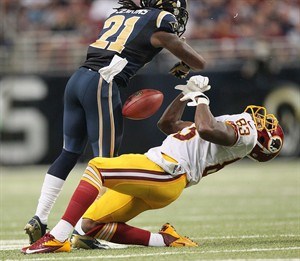
St. Louis Rams cornerback Janoris Jenkins (21) knocks the ball loose as he hits Washington tight end Fred Davis during fourth quarter action of an NFL football game on Sunday, Sept. 16, 2012 at the Edward Jones Dome in St. Louis.A study looks at the prevalence of cognitive impairment among former pro football players who sustained multiple concussions. THE CANADIAN PRESS/AP Photo/St. Louis Post-Dispatch, Chris Lee EDWARDSVILLE INTELLIGENCER OUT; THE ALTON TELEGRAPH OUT
January 07, 2013 - 2:10 PM
TORONTO - Former pro football players may be more likely to develop cognitive impairment and depression as they grow older than peers of the same age who weren't engaged in the rough and tumble sport, research suggests.
Pro football players, like their hockey and soccer counterparts, have a high risk of sustaining multiple concussions during their careers, which in some people can have long-term adverse effects on brain function.
In a study published Monday in JAMA Neurology, researchers found 14 of 34 former NFL players recruited from the north Texas region exhibited symptoms of cognitive impairment and/or depression. Some of the participants, ranging in age from 41 to 79, were former Dallas Cowboys, while some hailed from other NFL teams.
Four of the 14 were diagnosed with a fixed cognitive deficit, which dated back to the brain trauma, while eight had mild cognitive impairment and two had dementia. Eight of the 34 ex-players had depression, including three also found to be cognitively impaired, said Dr. John Hart, a neuroscientist at the University of Texas who led the study.
Cognitive deficits and depression appeared to be more common in the former players than in the general population, represented in the study by a group of healthy "controls," who had not suffered a concussion and were matched for age, education and IQ to the athletes.
Even so, the study found that 20 of the aging ex-NFLers were assessed as "cognitively normal," suggesting that other factors besides concussion play a role in whether cognitive abnormalities develop.
"Not everybody who has concussions, even at the level of professional athletes who have a fair amount of head contact, not everybody winds up with difficulties," said Hart, medical science director at the university's Center for Brain Health.
"More than half the guys had no deficits or no (brain-) imaging abnormalities, so what can we learn from those individuals that tells us a lot about what could be causing or contributing?"
Researchers put the former players through a battery of tests: all 34 had neurological and neuropsychological exams, while 26 of them also underwent detailed brain imaging. The results were compared to imaging data from 26 healthy controls.
"In our cohort of retired players, we found generally mild difficulties in naming and word finding and in episodic memory (verbal and visual)," the authors write." The memory impairment we observed is consistent with previous findings of persistent memory impairments after concussion in some cases.
"We also detected word-finding difficulties that have not been previously reported in aging cohorts of retired players."
What's of particular interest is that specialized brain imaging turned up “significant differences” in areas of white matter in the brains of cognitively impaired and depressed retired players, compared with healthy controls. (White matter is the pale tissue that makes up the "wires" of the brain, transporting signals between different regions.)
Variations in blood flow in areas of abnormal white matter corresponded to regions associated with impaired neurocognitive performance, such as problems with memory, naming and word finding, the study found.
"There's something going on actively in these individuals that gave us an understanding that it might be a mechanism that's causing the problem," Hart said from Dallas.
"If that's the case, then it gives you ideas about how to design preventives and treatments for this."
Hart said imaging white matter and blood flow may one day prove to be a way of testing individuals at risk for brain trauma-related dementia or milder cognitive impairment, among them athletes who have suffered concussions and military personnel or car accident victims who have sustained head injuries.
"As people are older and start developing (cognitive) difficulties, can we develop a good set of screening tools to use so that physicians can find a way to say, 'Yes, it looks like you are getting something' — and hopefully, from my perspective, that we can tell before we get something that they are at risk."
In an editorial, Drs. Ramon Diaz-Arrastia and Daniel Perl say there is growing concern about chronic traumatic encephalopathy (CTE), a degenerative disease found in the autopsied brains of a number of deceased pro football and hockey players known to have suffered multiple concussions.
“Of particular concern is the possibility that serious neurologic ... (conditions from) repeated mild traumatic brain injuries are not limited to professional football players, but may also occur in amateur collegiate athletes and even adolescent and younger players,” write Diaz-Arrastia and Perl of the Uniformed Services University of the Health Sciences in Bethesda, Md.
Because symptoms of CTE, such as irritability, depression and cognitive problems, are non-specific, "biomarkers" from neuroimaging could likely improve the accuracy of diagnosis during a person's lifetime, they write.
News from © The Canadian Press, 2013